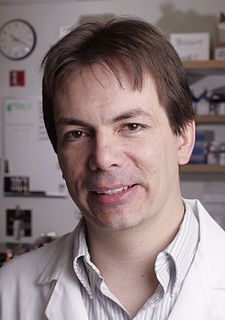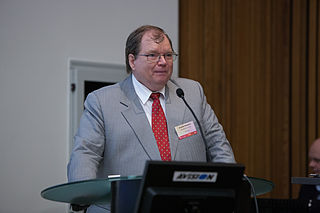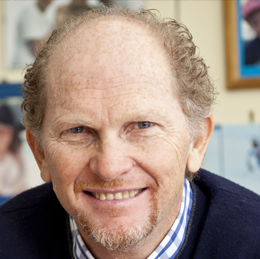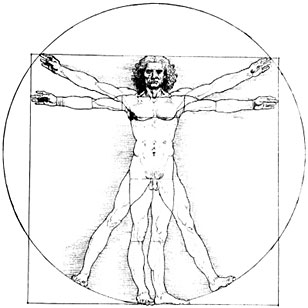The Institute of Biosciences and Technology (IBT), a component of the Texas A&M Health Science Center represents the Texas A&M University System, one of the two main Texas state university systems, in the state's and world's largest medical center, the Texas Medical Center, in Houston, Texas. The institute provides a bridge between Texas A&M University System scientists and other institutions' researchers working in the Texas Medical Center and the biomedical and biotechnology research community in Houston. It emphasizes collaboration between member scientists and others working in all the fields of the biosciences and biotechnology. IBT encourages its scientists to transfer discoveries made in their laboratories to the clinic and marketplace.
C. Thomas Caskey is an American internist who has been a prominent medical geneticist and biomedical entrepreneur. He is editor of the Annual Review of Medicine.

The 1000 Genomes Project, launched in January 2008, was an international research effort to establish by far the most detailed catalogue of human genetic variation. Scientists planned to sequence the genomes of at least one thousand anonymous participants from a number of different ethnic groups within the following three years, using newly developed technologies which were faster and less expensive. In 2010, the project finished its pilot phase, which was described in detail in a publication in the journal Nature. In 2012, the sequencing of 1092 genomes was announced in a Nature publication. In 2015, two papers in Nature reported results and the completion of the project and opportunities for future research. Many rare variations, restricted to closely related groups, were identified, and eight structural-variation classes were analyzed.

Manchanahalli Rangaswamy Satyanarayana Rao known by the abbreviation M. R. S. Rao, is an Indian scientist, born on 21 January 1948 at Mysore, India. He has been awarded the fourth highest civilian award Padma Shri in Science and Engineering category by the Government of India. He was the President of Jawaharlal Nehru Centre for Advanced Scientific Research (JNCASR), Bangalore, India (2003-2013)

Huda Yahya Zoghbi, born Huda El-Hibri, is a Lebanese-born American geneticist, and a professor at the Department of Molecular and Human Genetics, Baylor College of Medicine. Her work helped elucidate mechanisms of Rett syndrome and spinocerebellar ataxia type 1. In 2017, she was awarded the Canada Gairdner International Award and the Breakthrough Prize in Life Sciences.
Richard K. Wilson is a leading American molecular geneticist. He is the founding Executive Director of the Institute for Genomic Medicine at Nationwide Children’s Hospital and Professor of Pediatrics at the Ohio State University College of Medicine. He received his A.B. degree (Microbiology) from Miami University in Ohio in 1981, his Ph.D. (Chemistry) from the University of Oklahoma in 1986, and was a Research Fellow in the Division of Biology at the California Institute of Technology (1986-1990). In 1990, Dr. Wilson joined the faculty of Washington University School of Medicine where he co-founded the Genome Sequencing Center/McDonnell Genome Institute. At Washington University, Dr. Wilson was the Alan A. and Edith L. Wolff Distinguished Professor of Medicine, Professor of Genetics, Professor of Molecular Microbiology, and a member of the Senior Leadership Committee of the Siteman Cancer Center.

George M. Weinstock is an American geneticist and microbiologist on the faculty of The Jackson Laboratory for Genomic Medicine, where he is a professor and the associate director for microbial genomics. Before joining The Jackson Laboratory, he taught at Washington University in St. Louis and served as associate director of The Genome Institute. Previously, Dr. Weinstock was Co-Director of the Human Genome Sequencing Center (HGSC) at Baylor College of Medicine in Houston, Texas, and Professor of Molecular and Human Genetics there.[1] He received his B.S. degree from the University of Michigan in 1970 and his Ph.D. from the Massachusetts Institute of Technology in 1977. He has spent most of his career taking genomic approaches to study fundamental biological processes.

Evan E. Eichler is an investigator at Howard Hughes Medical Institute studying human genome evolution, genome variation and their role in diseases. He is also a Professor of Genome Sciences at the University of Washington School of Medicine, Seattle.

John Stanley Mattick is an Australian molecular biologist known for his efforts to assign function to non-coding DNA. Mattick was the Executive Director of the Garvan Institute of Medical Research from 2012 to 2018. He joined Genomics England in May 2018 as Chief Executive Officer.

Andres Metspalu is an Estonian geneticist and member of the Estonian Academy of Sciences.
Dr. Margaret (“Peggy”) A. Goodell is an American scientist working in the field of stem cell research. Goodell is Professor at Baylor College of Medicine and Director of the Stem Cell and Regenerative Medicine (STaR) Center. She is best known for her discovery of a novel method to isolate adult stem cells.
AHDC1 is a gene, changes in which are found through clinical studies to cause an array of symptoms in affected children known collectively as Xia-Gibbs Syndrome, including global developmental delay, global hypotonia, obstructive sleep apnoea and seizures.
Xia-Gibbs Syndrome, is a newly discovered genetic disorder caused by a heterozygous mutation in the AHDC1 gene on chromosome 1p36.

Andrea Ballabio is an Italian scientist and academic professor. He is director of the Telethon Institute of Genetics and Medicine (TIGEM) of Pozzuoli; Professor of Medical Genetics at the Federico II University of Naples and Visiting Professor of Genetics at Baylor College of Medicine in Houston, Texas, USA and at the University of Oxford.
Elena L. Grigorenko is an American clinical psychologist and the Hugh Roy and Lillie Cranz Cullen Distinguished Professor of Psychology at the University of Houston, where she has taught since September 2015. She is also a professor in the Department of Molecular and Human Genetics at Baylor College of Medicine.
Mark Joseph Daly is Director of the Institute for Molecular Medicine, Finland (FIMM) at the University of Helsinki, a Professor of Genetics at Harvard Medical School, Chief of the Analytic and Translational Genetic Unit at Massachusetts General Hospital, and a member of the Broad Institute of MIT and Harvard. In the early days of the Human Genome Project, Daly helped develop the genetic model by which linkage disequilibrium could be used to map the haplotype structure of the human genome. In addition, he developed statistical methods to find associations between genes and disorders such as Crohn's disease, inflammatory bowel disease, autism and schizophrenia.
David L. Nelson is an American human geneticist, currently an associate director at the Intellectual and Developmental Disabilities Research Center (1995), and professor at the Department of Molecular and Human Genetics at Baylor College of Medicine BCM since 1999. Since 2018, he is the director at the Cancer and Cell Biology Ph.D program, and the director of Integrative Molecular and Biomedical Sciences Ph.D since 2015 at BMC.









